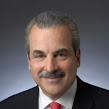Koplewicz discussed the growing problem of teenage depression in America and offered help to adults differentiate clinical depression from normal teenage angst, disappointment and sadness. Koplewicz explained how to recognize the warning signs of depression and suicide. His presentation explained how adults can counteract general anxiety in children and explained how to best provide them with steady and warm emotional nourishment.
Koplewicz is widely recognized as an innovator and master clinician. He is president of The Child Mind Institute, an independent nonprofit organization exclusively dedicated to transforming mental healthcare for children.Presentation slides from this event, More Than Moody: how to understand teen depression and raise resilient and secure kids, can be found HERE
Click HERE for a recording of the program.
TAKE-AWAY
Janet Cook, Assistant Superintend of Student Services hosted the event and shared the following takeaway:
"In addressing the growing problem of teenage depression and suicide, world-renowned psychiatrist Dr. Harold Koplewicz likened the role of parents and educators to that of scaffolding used in the "construction project" of building up children. The main pillars are structure, support, and encouragement, while the intersecting planks are monitoring, awareness, warmth, patience, and dispassion (with calm constructive honesty). He describes “swooping in” to fix or handle issues for teens as tantamount to saying “You are incompetent and can’t do it without me.” The goal is to eventually take the scaffolding down when our teens are ready to stand on their own.
Koplewicz advises we prioritize factors that protect kids from depression and suicide, including family and school connectedness, academic engagement, and having future plans and goals. At home, he recommends investing time and attention early on and implementing rituals that make it easy to talk. We also need to engage in kids’ individual interest and use labeled praise (giving specific examples) when kids do positive and helpful things.
If changes in typical behavior point to a possible mental health challenge, be direct with questions about self-harm. Stay calm. Listen to understand their feelings from their point of view, and offer hope that solutions exist. In his closing comments, in response to a question, Dr. Koplewicz welcomed us to use the educational videos below (California Healthy Minds, Thriving Kids Project, under Resources). . They wonderfully support our Glenbard initiatives for student engagement, and offer caregivers information on essential mental health skills."
RESOURCES
The California Healthy Minds, Thriving Kids Project, provides evidence-based resources to spark important conversations and teach your kids a set of essential mental health skills. These videos feature an engaging host and interviews with a diverse group of real kids. They teach key skills while normalizing the challenges kids face and sparking productive conversations. There are 5 episodes in the series, each teaching a different mental health skill. Corresponding activity sheets summarize and reinforce key ideas in each video. You can watch the entire series in one session, or watch each episode individually :
Videos:
- Koplewicz interviewing actor Emma Stone on her experience with anxiety HERE (YouTube Oct 1, 2018)
- Taking Time for Your Child in 60 seconds by Dr. Harold Koplewicz HERE (YouTube Jun 29, 2017)
- GRIT - Part 2: Resilience – Dr. Harold Koplewicz HERE (YouTube May 5, 2015)
Links:
- COVID and Kids Mental Health from Child Mind Institute HERE
- 2021 Annual Report, Answering the Call: Scaling Support for Children’s Mental Health HERE
- Child Mind Institute Family Resource Center HERE


